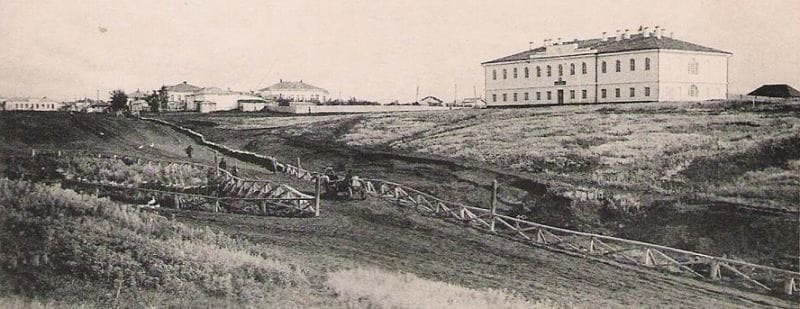Вы здесь
Abylay-khan residence in Petropavlovsk.
Tours in Petropavlovsk.
“I, Ablai-Saltan, wish you hello, all our subjects bow to you. I declare to myself that I have freed myself from Galdan-Cherenyev’s hands in good health and with honor and have arrived at the house. Galdan-Cherenj has me for my son, and your nephew Septen has for my brother less. And I call you a smaller brother.”
A letter addressed to the widow of the Kalmyk Khan of Darma-Bale from Abylai-khan.
Sights of Petropavlovsk.
Historical and memorial complex "Residence of Abylay Khan" is located at an altitude of 116 meters above sea level, located on Karim Sutyushev (Potania) street, 1 b, in square of Teatralnaya, Kurganskaya - Ulyanova, Potanina streets in northwestern part of town of Petropavlovsk, in North Kazakhstan region.
The historical and memorial complex “Residence of Ablai Khan” was opened in 2008, architects: Baimagambeto in S., Zatay V. Sculptor: Satybaldin K. According to archives, this was the residence of Abylai Khan, built by order of Empress Catherine II in 1762 - 1765.
Unfortunately, this wooden building was destroyed after a fire in the 19th century; the exact location of the building is disputed by historians and local historians. In 1829, a stone building was built in its place. At the beginning of the last century, the building housed a military hospital, then a barracks, but by the end of the century the building was abandoned.
The two-story building was nicknamed “Abylay’s White House.” According to some versions, Abylai’s son lived in the stone house. As part of the State Program "Cultural Heritage" for 2004 - 2006, a project was developed to recreate and restore the "Residence of Ablai Khan".
At the central entrance to the complex there is a monument to Abylai Khan on horseback.
Historical and museum complex "Residence of Abylay Khan" includes:
- Museum of the History of the Bukeev Horde,
- Museum of Independence,
- the armory of the Khan's palace,
- Museum of Public Education in the Bukeevskaya Horde,
- house of A. Sergachev,
- Pedagogical College building, built in 1868,
- a pantheon of memory which consists of three mausoleums of Zhangir Khan, Dauletkerey (khan’s cousin) and Mukhamedsalyk Babajanov (a student of the khan, historian and ethnographer, whose ashes were reburied from the territory of
military training ground). All three mausoleums were built in different architectural styles.
The area of the Ablai Khan Residence complex is 1,288.5 square meters.
In historical and memorial complex "Abylai-khan's Residence" there are 4 rooms:
First room in complex "Abylai-khan's Residence":
introduces the genealogy of Abylai, the years of his childhood and growing up. He was chosen as khan when he was 20 years old, and his real name is Abilmansur. Here an interesting collection of weapons is assembled - a wick gun, national sabers of the Kazakhs, shields.
Second room in complex "Abylai-khan's Residence":
represents the chambers of Abylay-khan, where you can see a traditional wooden bed with inlaid bones, carpets, chests and other interior items.
In third hall in complex "Abylai-khan's Residence":
of the House of Abylai, the figure of the khan himself is installed on the throne. Here are exhibited his jewelry, ring-seal, weapons, clothes for men and women, some traditional household items.
Fourth room in complex "Abylai-khan's Residence":
is dedicated to the personality of the khan as a competent diplomat. The hall contains various historical documents telling about Abylay’s policy in building relations with Russia and China, as well as strengthening the statehood of his people. In a difficult historical period, Abylay managed to maintain unity and defend the independence of the state.
Address: Karim Sutyusheva street, 1B.
Geographic coordinates of historical and memorial complex “Residence of Ablai Khan”: N54°52'25 E69°07'02

Authority and photos by:
“Based on field research. Ermaganbetova K. December 2016. "Register of memorial complexes built during the period of independence." "Practices and places of memory in Kazakhstan." Medeuova K.A., Sandybaeva U.M., Naurzbaeva Z.Zh., Tolgambaeva D.T., Ermaganbetova K.S., Melnikov D.N., Kikimbaev M.Zh., Ramazanova A.Ch., Tlepbergen A .B., Zhetibaev E.Zh., Orazbaeva D.E., Poltavets K.A.







